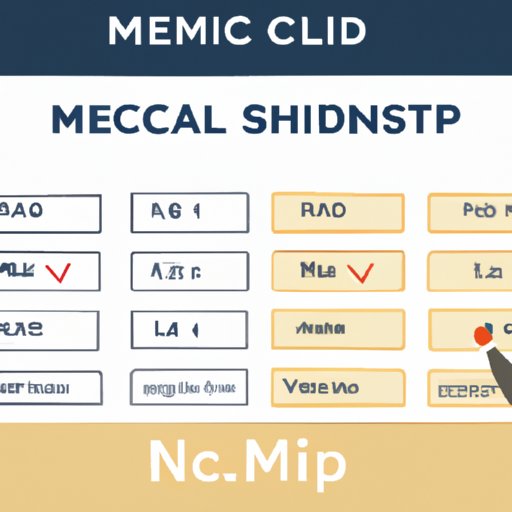An Overview of the Residency Match Process
The residency match process is an essential part of medical school and residency programs. It is a formal process that matches medical students with residency programs based on their preferences and qualifications. The process is designed to ensure that medical students are matched with the best possible residency programs for their needs.
To understand how the residency match process works, it’s important to first define what a residency match is. A residency match is a formal agreement between a medical student and a residency program. Through this agreement, the student agrees to complete a certain number of years of training as an intern or resident in the program. In exchange, the residency program agrees to provide the student with the necessary resources and support to successfully complete the training.
The residency match process involves several steps. First, medical students must apply to residency programs they are interested in. During the application process, they must submit documents such as transcripts, letters of recommendation, personal statements, and USMLE scores. Once applications are submitted, both medical schools and residency programs will review them and determine if they meet their criteria.
Once medical schools and residency programs have reviewed the applications, they will then rank their applicants. The rankings are based on a variety of factors including academic performance, personal statements, interviews, letters of recommendation, and USMLE scores. After the rankings are completed, the National Resident Matching Program (NRMP) will use the rankings to match applicants with residency programs.
Examining the Factors That Influence the Residency Match Process
There are several factors that can influence the outcome of the residency match process. Academic performance is one of the most important factors. Medical students must demonstrate strong academic performance in order to be considered for a residency program. Schools and programs will look at grades, test scores, and other measures of academic achievement when reviewing applications.
In addition to academic performance, the personal statement is also a key factor in the match process. This document provides an opportunity for medical students to explain why they are a good fit for a particular program. It should be well written, clearly articulated, and showcase the student’s strengths and qualifications.
Interviews are another important factor in the residency match process. During the interview, applicants have the chance to demonstrate their knowledge, skills, and commitment to the profession. It is important to prepare for the interview and present oneself in a professional manner.
Letters of recommendation are also an important factor in the match process. These letters provide an outside perspective on the applicant’s qualifications and can help to bolster an application. It is important to obtain letters from individuals who can speak to the applicant’s strengths and weaknesses.
Finally, USMLE scores are a critical factor in the match process. USMLE scores are used to measure a candidate’s readiness for medical practice. These scores should be taken seriously and applicants should strive to achieve the highest score possible.

Analyzing the Benefits of Participating in a Residency Match Program
Participating in the residency match program offers numerous benefits. One of the main benefits is that it increases the chances of matching with one’s preferred program. By participating in the match process, applicants are more likely to be matched with the program of their choice.
Another benefit of participating in the match process is that it increases the chances of receiving an acceptance offer. The match process allows applicants to make a strong impression on schools and programs, which increases their chances of being accepted into the program.
Finally, participating in the match process offers greater opportunities to negotiate terms of employment. By participating in the match process, applicants can negotiate salaries, benefits, and other terms of employment with the program they are matched with.

Understanding the Significance of Residency Match Results
It is important to understand the significance of the residency match results. For those who match with a program, it is a major accomplishment and the beginning of a long and rewarding career in medicine. For those who do not match with a program, it can be a difficult and disappointing experience.
For those who match with a program, it is important to understand the responsibilities associated with their new position. They will need to adhere to the rules and regulations of the program, complete the required training, and demonstrate professionalism at all times. Additionally, they will need to maintain a high level of academic performance during their residency.
For those who do not match with a program, it is important to remember that there are still options available. There are alternative pathways to becoming a practicing physician, such as applying for a fellowship or completing additional training. Additionally, it is important to stay positive and continue to work hard to improve one’s chances of matching with a program in the future.

Exploring Strategies for Improving Your Chances in the Residency Match
There are several strategies that can be employed to improve one’s chances in the residency match process. The first is to improve one’s academic performance. This includes taking challenging courses, studying diligently, and striving for the highest grades possible.
Another strategy is to enhance one’s personal statement. This document should be well written, articulate, and showcase the applicant’s qualifications and accomplishments. Additionally, it should demonstrate the applicant’s passion for the field and commitment to the profession.
Improving one’s interview skills is also important. During the interview, applicants should demonstrate their knowledge, skills, and commitment to the profession. Taking mock interviews and researching common interview questions can help to prepare for the real thing.
Getting quality letters of recommendation is also important. These letters should come from individuals who can speak to the applicant’s strengths and weaknesses. It is important to choose recommenders who can write detailed and informative letters.
Finally, increasing one’s USMLE score is essential. Applicants should strive for the highest score possible in order to stand out from the competition. Studying for the exam and taking practice tests can help to prepare for the real thing.
Conclusion
The residency match process is an important part of medical school and residency programs. It is a formal process that matches medical students with residency programs based on their preferences and qualifications. There are several factors that can influence the outcome of the match process, including academic performance, personal statement, interviews, letters of recommendation, and USMLE scores. Participating in the match process offers numerous benefits, including improved chances of matching with one’s preferred program, increased chance of receiving an acceptance offer, and greater opportunities to negotiate terms of employment. Finally, there are several strategies that can be employed to improve one’s chances in the match process, including improving academic performance, enhancing the personal statement, improving interview skills, getting quality letters of recommendation, and increasing USMLE scores.
(Note: Is this article not meeting your expectations? Do you have knowledge or insights to share? Unlock new opportunities and expand your reach by joining our authors team. Click Registration to join us and share your expertise with our readers.)
